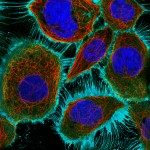Link to HAL – pasteur-04703348
Link to DOI – 10.1038/s41467-024-47717-3
Nature Communications, 2024, 15 (1), pp.4023. ⟨10.1038/s41467-024-47717-3⟩
Abscission is the final stage of cytokinesis, which cleaves the intercellular bridge (ICB) connecting two daughter cells. Abscission requires tight control of the recruitment and polymerization of the Endosomal Protein Complex Required for Transport-III (ESCRT-III) components. We explore the role of post-translational modifications in regulating ESCRT dynamics. We discover that SMYD2 methylates the lysine 6 residue of human CHMP2B, a key ESCRT-III component, at the ICB, impacting the dynamic relocation of CHMP2B to sites of abscission. SMYD2 loss-of-function (genetically or pharmacologically) causes CHMP2B hypomethylation, delayed CHMP2B polymerization and delayed abscission. This is phenocopied by CHMP2B lysine 6 mutants that cannot be methylated. Conversely, SMYD2 gain-of-function causes CHMP2B hypermethylation and accelerated abscission, specifically in cells undergoing cytokinetic challenges, thereby bypassing the abscission checkpoint. Additional experiments highlight the importance of CHMP2B methylation beyond cytokinesis, namely during ESCRT-III-mediated HIV-1 budding. We propose that lysine methylation signaling fine-tunes the ESCRT-III machinery to regulate the timing of cytokinetic abscission and other ESCRT-III dependent functions.


